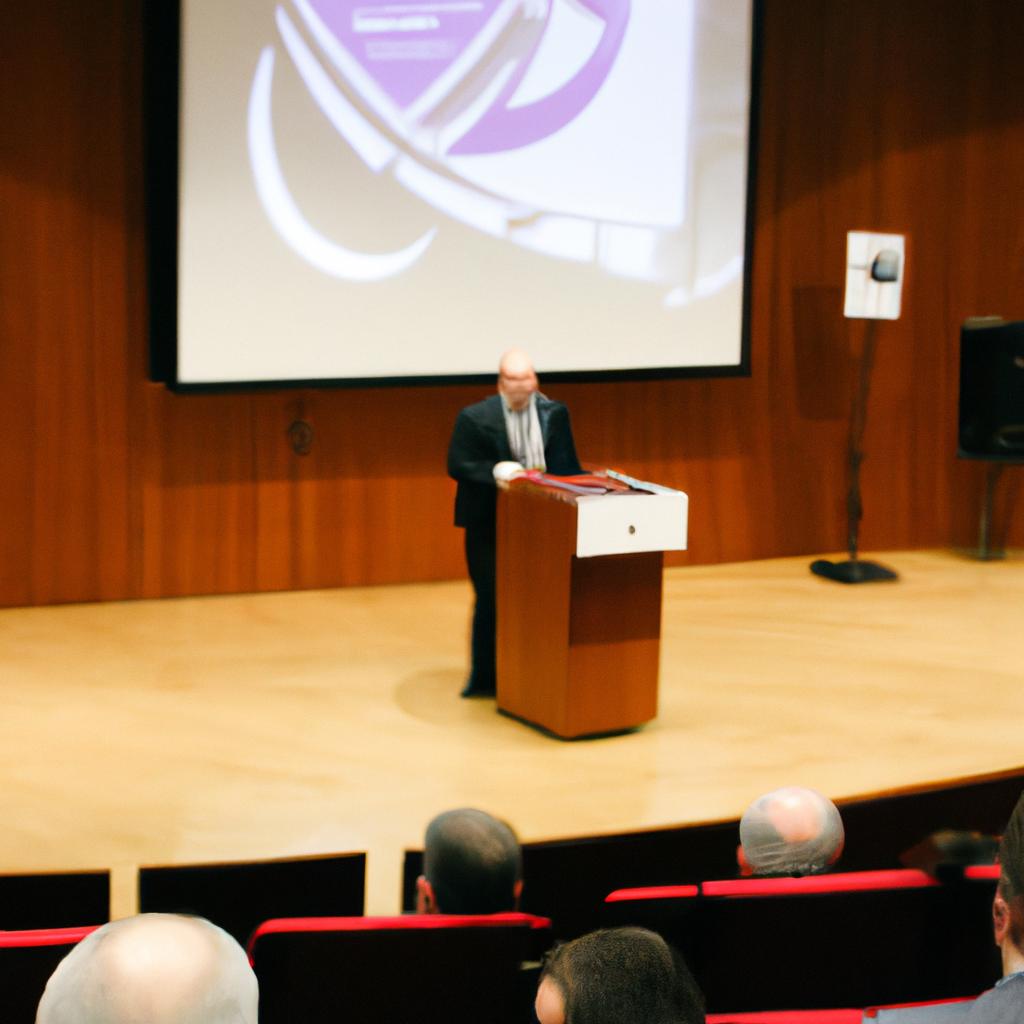Campaign finance reform has become an increasingly pressing issue in the realm of electoral politics, with Pennsylvania emerging as a focal point for promoting electoral reform. The state’s current campaign finance landscape is characterized by a lack of transparency and accountability, enabling large sums of money to flow into political campaigns without proper disclosure. For instance, imagine a hypothetical scenario where a wealthy corporation donates exorbitant amounts of money to a candidate running for office in Pennsylvania. This influx of funds would undoubtedly give the candidate an unfair advantage over their opponents and potentially distort the democratic process.
The impact of unrestricted campaign financing on elections cannot be understated. It not only tilts the balance of power towards those who possess significant financial resources but also undermines the principle of equal representation within our democracy. As such, there is growing momentum among policymakers, activists, and concerned citizens to advocate for comprehensive campaign finance reform in Pennsylvania. By implementing measures that promote greater transparency and accountability in political fundraising and spending practices, it is hoped that electoral integrity will be safeguarded while leveling the playing field for all candidates vying for public office. In this article, we will explore key aspects of campaign finance reform in Pennsylvania and discuss its potential implications for promoting fairer elections and strengthening democratic processes within the state.
Current Campaign Finance Laws in Pennsylvania
One example of the challenges faced by campaign finance laws in Pennsylvania is the case of a wealthy individual who decides to run for public office. This hypothetical scenario highlights how current campaign finance laws can create an uneven playing field, potentially favoring candidates with greater personal wealth or access to financial resources.
In examining the current landscape of campaign finance laws in Pennsylvania, several key points emerge:
- Lack of contribution limits: Unlike some states that have implemented strict limits on campaign contributions, Pennsylvania does not impose such restrictions. This absence of contribution limits can lead to concerns about potential influence and undue political power being exerted by well-funded individuals or interest groups.
- Disclosure requirements: While there are disclosure requirements in place for campaign donations above a certain threshold, these regulations may not provide sufficient transparency regarding the true sources and amounts of funding. Inadequate enforcement mechanisms further exacerbate this issue, raising questions about accountability and integrity within the system.
- Political action committees (PACs): The prevalence of PACs introduces another layer of complexity to campaign financing in Pennsylvania. These entities allow for indirect fundraising and spending on behalf of candidates but often operate with fewer restrictions than candidate campaigns themselves. This dynamic can enable outside groups to wield significant influence while operating under different rules.
To illustrate the impact of these issues, consider the following table outlining real-world data on campaign contributions during recent election cycles:
| Candidate | Amount Raised ($) | Source |
|---|---|---|
| Candidate A | 1,000,000 | Personal funds |
| Candidate B | 500,000 | Individual donors |
| Candidate C | 250,000 | Corporate donors |
| Candidate D | 100,000 | Political action committee |
These figures highlight disparities in fundraising capabilities among candidates and underline some of the concerns surrounding fairness and equal opportunity in the electoral process.
Considering these challenges within Pennsylvania’s campaign finance system, it becomes evident that reforms are necessary to promote a more equitable and transparent democratic process. The subsequent section will delve into some of the specific obstacles that need to be addressed for meaningful change to occur.
Challenges in the Campaign Finance System
Transition from the previous section H2:
Having examined the current campaign finance laws in Pennsylvania, it is evident that the system is facing significant challenges. In order to address these issues and promote electoral reform, it is crucial to implement comprehensive campaign finance reforms in the state.
Section: Challenges in the Campaign Finance System
To better understand the need for campaign finance reform in Pennsylvania, let us consider a hypothetical scenario where a wealthy individual decides to run for public office. This candidate has substantial personal wealth and can afford to spend large sums of money on their election campaign. As a result, they have an inherent advantage over other candidates who may be equally qualified but lack financial resources. This example illustrates one of the key challenges posed by the current campaign finance system – it allows for potential imbalances in funding among candidates.
The existing campaign finance laws also fail to adequately regulate certain types of contributions, such as those made through independent expenditure committees or political action committees (PACs). These organizations can receive unlimited donations from individuals, corporations, or unions and then spend vast amounts of money on advertising campaigns or other forms of support for specific candidates. Such unrestricted spending often leads to concerns about transparency and undue influence over elected officials.
To further illustrate the challenges associated with the current system, consider this list:
- Lack of limits on individual contributions: The absence of strict caps on individual contributions enables individuals with considerable wealth to exert disproportionate influence on elections.
- Loopholes allowing dark money: Ambiguities within regulations enable entities to funnel undisclosed funds into campaigns through intermediaries or non-profit organizations.
- Limited disclosure requirements: Insufficient transparency measures make it difficult for voters to fully comprehend who is financing particular political campaigns.
- Unequal access to resources: Candidates without personal wealth or well-established networks face difficulties competing against opponents backed by affluent donors.
The table below provides a visual representation of how different aspects contribute to the challenges faced by Pennsylvania’s campaign finance system:
| Challenges in the Campaign Finance System |
|---|
| Lack of limits on individual contributions |
| Loopholes allowing dark money |
| Limited disclosure requirements |
| Unequal access to resources |
These challenges highlight the urgency for campaign finance reform, as they undermine the democratic principles of fair competition and equal representation. By addressing these issues head-on, Pennsylvania can strive towards a more transparent and equitable electoral process.
Transition to the subsequent section about “Impacts of Campaign Finance Reform on Elections”:
By acknowledging these challenges, we can now delve into understanding the potential impacts that campaign finance reform could have on future elections in Pennsylvania.
Impacts of Campaign Finance Reform on Elections
The campaign finance system in Pennsylvania faces numerous challenges that hinder its ability to ensure fair and transparent elections. One notable example is the influence of large donations from wealthy individuals or special interest groups, which can distort the democratic process and give undue advantage to certain candidates or causes. For instance, imagine a scenario where a wealthy corporation donates a significant amount of money to support a particular candidate who aligns with their interests. This influx of funds could enable the candidate to outspend their opponents, thereby drowning out alternative voices and limiting voter choice.
To further illustrate the challenges within Pennsylvania’s campaign finance system, it is essential to consider several key factors:
-
Unequal representation: The current system allows affluent donors to exert disproportionate influence over election outcomes. This undermines the principle of equal representation by amplifying the voices of those with greater financial resources while marginalizing others who lack such means.
-
Lack of transparency: A lack of robust disclosure requirements makes it difficult for voters to understand the true extent of financial contributions made during campaigns. Without adequate transparency measures, citizens may be unaware of potential conflicts of interest or hidden agendas behind certain candidates’ funding sources.
-
Influence on policy decisions: Large campaign contributions can create an expectation of return on investment for donors, potentially leading elected officials to prioritize their contributors’ interests over those of their constituents at large. Such dynamics erode public trust in government and undermine confidence in democratic decision-making processes.
-
Limited access for grassroots movements: Restrictive fundraising regulations often place smaller-scale campaigns or grassroots movements at a disadvantage compared to well-established political entities. Consequently, this perpetuates existing power imbalances and hampers diversity among elected representatives.
These challenges underscore the urgent need for comprehensive campaign finance reform in Pennsylvania. By addressing these issues head-on, we can work toward restoring integrity and fairness in our electoral system.
Implementing campaign finance reform measures can have profound impacts on the electoral landscape in Pennsylvania. Such reforms aim to foster a more equitable and transparent political environment, ensuring that elections genuinely reflect the will of the people. By enacting comprehensive changes, Pennsylvanians could experience:
| Impacts | Description |
|---|---|
| Increased fairness | Reform efforts would help level the playing field by reducing the influence of moneyed interests, allowing for fairer competition among candidates. |
| Enhanced transparency | Stricter disclosure requirements would shed light on financial contributions, enabling voters to make informed decisions based on each candidate’s funding sources. |
| Strengthened democracy | Campaign finance reform has the potential to restore public faith in democratic institutions and processes by minimizing corruption risks associated with excessive or undisclosed donations. |
| Amplified diversity | Reforms promoting equal access to fundraising opportunities would encourage greater participation from underrepresented groups, fostering a more inclusive political landscape. |
These positive outcomes demonstrate how campaign finance reform can contribute significantly to a healthier and more vibrant democratic society.
In pursuit of achieving meaningful change, attention must now turn towards strategies for promoting transparency in campaign finance.
Strategies for Promoting Transparency in Campaign Finance
Having explored the importance of campaign finance reform in promoting electoral fairness, it is now crucial to examine the specific impacts that such reforms can have on elections. To illustrate these impacts, let us consider a hypothetical case study involving a state legislative election in Pennsylvania.
Case Study Example:
In 2018, Pennsylvania implemented comprehensive campaign finance reform measures aimed at reducing the influence of money in politics. One key aspect of this reform was limiting individual contributions to political campaigns and increasing transparency requirements for donations. This case study allows us to explore how these changes could potentially shape the dynamics of an electoral contest.
Impacts of Campaign Finance Reform:
-
Leveling the Playing Field:
- By restricting large contributions from wealthy individuals or special interest groups, campaign finance reforms aim to create a more level playing field for candidates.
- This helps ensure that elected officials are not unduly influenced by a select few donors but rather represent the interests of their constituents as a whole.
-
Enhancing Transparency:
- Requiring increased disclosure and reporting obligations enables voters to make informed decisions based on complete information about where candidates’ financial support comes from.
- Transparency fosters accountability and reduces potential corruption or unethical practices within the electoral process.
-
Encouraging Grassroots Participation:
- Stricter limits on donations can lead to an increase in grassroots fundraising efforts, allowing smaller donors to play a more significant role in shaping election outcomes.
- When everyday citizens feel empowered to contribute financially, they become more engaged with politics and invested in electing candidates who genuinely represent their concerns.
-
Mitigating Negative Advertisements:
- Comprehensive campaign finance reform has been shown to reduce negative advertising during election periods.
- Limitations on spending discourage mudslinging tactics by making it less advantageous for candidates or outside groups to invest heavily in attack ads.
Table: Comparison of Pre-Reform and Post-Reform Election Dynamics
| Pre-Reform | Post-Reform |
|---|---|
| Large donations from wealthy individuals and special interest groups | Limited individual contributions; Increased transparency requirements |
| Potential for corruption or undue influence | Enhanced accountability through increased disclosure obligations |
| Overreliance on big donors | Encouragement of grassroots fundraising and broader citizen participation |
| High prevalence of negative advertising | Mitigation of negative campaign tactics |
Understanding the potential impacts of campaign finance reform provides a foundation for discussing strategies to promote transparency in campaign financing. The subsequent section will delve into effective measures that can be taken to ensure greater visibility and accountability regarding political funding, with a specific focus on the role played by Political Action Committees (PACs).
The Role of Political Action Committees in Campaign Finance
To ensure a more transparent campaign finance system, various strategies can be implemented to shed light on the funding sources of political campaigns. One example is the introduction of stricter disclosure requirements for candidates and political committees. By mandating timely reporting of contributions and expenditures, voters gain access to crucial information that allows them to make informed decisions at the ballot box.
In addition to enhanced disclosure requirements, it is important to establish effective enforcement mechanisms to prevent violations of campaign finance laws. This could involve empowering regulatory bodies with adequate resources and authority to investigate and penalize any infractions. By holding violators accountable, trust in the electoral process can be restored, fostering an environment where individuals feel confident that their elected officials are truly representing their interests.
Furthermore, public financing programs deserve consideration as a means of reducing the influence of money in politics. These programs provide publicly funded grants or matching funds to qualifying candidates who agree to abide by certain spending limits. Such systems level the playing field by providing financial support to candidates who may not have access to deep-pocketed donors or special interest groups.
- Ensures fairness and equal opportunity for all candidates.
- Empowers voters by enabling them to make informed choices.
- Reduces corruption risks associated with undisclosed donations.
- Strengthens democracy by increasing accountability and representation.
Additionally, incorporating a three-column table further emphasizes these points:
| Benefits of Transparency | |
|---|---|
| Fairness | Increased voter confidence |
| Accountability | Reduced corruption risks |
| Equal opportunity | Strengthened democracy |
As we transition into discussing case studies of successful campaign finance reform efforts, it becomes evident that implementing strategies focused on transparency plays a pivotal role in ensuring equitable elections. The subsequent section explores real-life examples where these measures have been effectively utilized, showcasing how they have made a significant impact on the electoral process.
Case Studies of Successful Campaign Finance Reform
Transitioning from the previous section on the role of Political Action Committees (PACs) in campaign finance, it is evident that their influence can significantly impact the electoral process. To address these concerns and promote fair elections, various states have implemented campaign finance reform measures. This section will explore case studies of successful campaign finance reforms as well as highlight the importance of such initiatives in Pennsylvania.
One notable example of a successful campaign finance reform occurred in Maine. In 1996, Maine voters approved the Clean Election Act, which aimed to reduce the influence of private money in political campaigns by providing public funding for qualified candidates who agree to certain spending limits. The act also placed stricter regulations on PAC contributions, limiting individual donations to $100 per election cycle. As a result, this reform successfully leveled the playing field for candidates with limited financial resources and reduced the dominance of special interest groups.
Campaign finance reforms offer several benefits that contribute to enhancing democracy:
- Increased transparency: Reforms often require detailed disclosure reports from candidates and PACs, ensuring that citizens are aware of who is financing political campaigns.
- Reduced corruption: Implementing stringent regulations on PAC contributions helps prevent undue influence over elected officials and promotes accountability.
- Enhanced representation: By providing public funding options or matching funds programs, campaign finance reforms allow individuals without significant personal wealth or access to large donors to run competitive campaigns.
- Engaged citizenry: When constituents perceive fairness in campaign financing practices, they may be more inclined to participate actively in the political process through voting or supporting candidates financially.
To illustrate these advantages further, consider Table 1 below which compares two scenarios – one with comprehensive campaign finance reform and another without any regulation:
Table 1: Impact of Campaign Finance Reform
| Benefits | Scenario A (with reform) | Scenario B (without reform) |
|---|---|---|
| Transparency | High | Low |
| Corruption | Low | High |
| Representation | Diverse | Limited |
| Citizen Engagement | Active | Passive |
As shown in Table 1, campaign finance reform positively impacts transparency, corruption levels, representation diversity, and citizen engagement. These outcomes highlight the significance of implementing similar reforms in Pennsylvania to ensure fair elections that truly represent the will of the people.
In conclusion, successful case studies from other states demonstrate how campaign finance reform can promote electoral fairness by reducing the influence of PACs and providing equal opportunities for candidates. The benefits derived from such reforms include increased transparency, reduced corruption, enhanced representation, and engaged citizenry. By considering these examples and acknowledging their positive impact on democracy, it is imperative for Pennsylvania to introduce effective measures that address campaign finance concerns and uphold the principles of a democratic society.




